

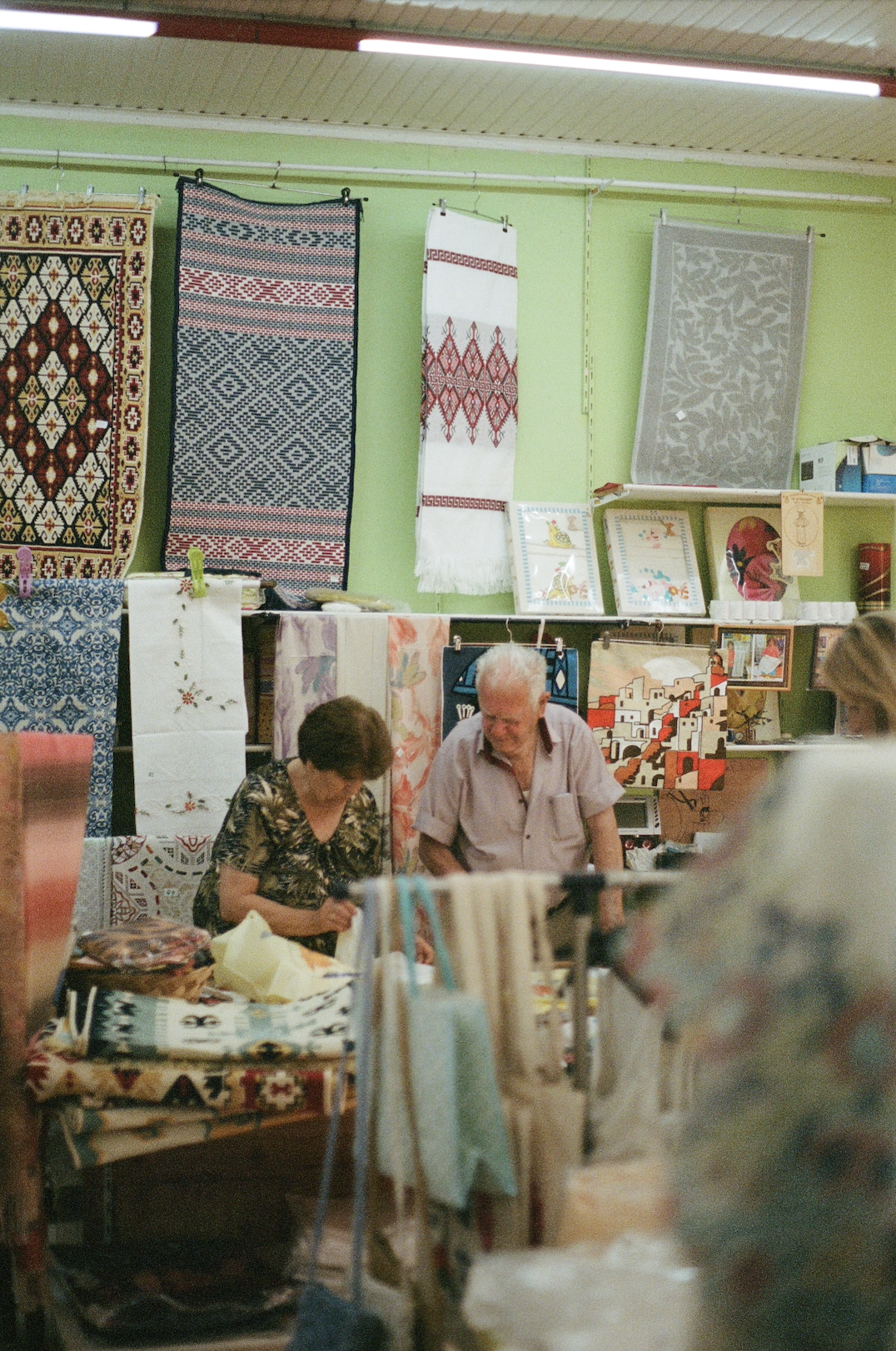
Threads passed down from mother to daughter, every stitch a memory of the ones who came before.
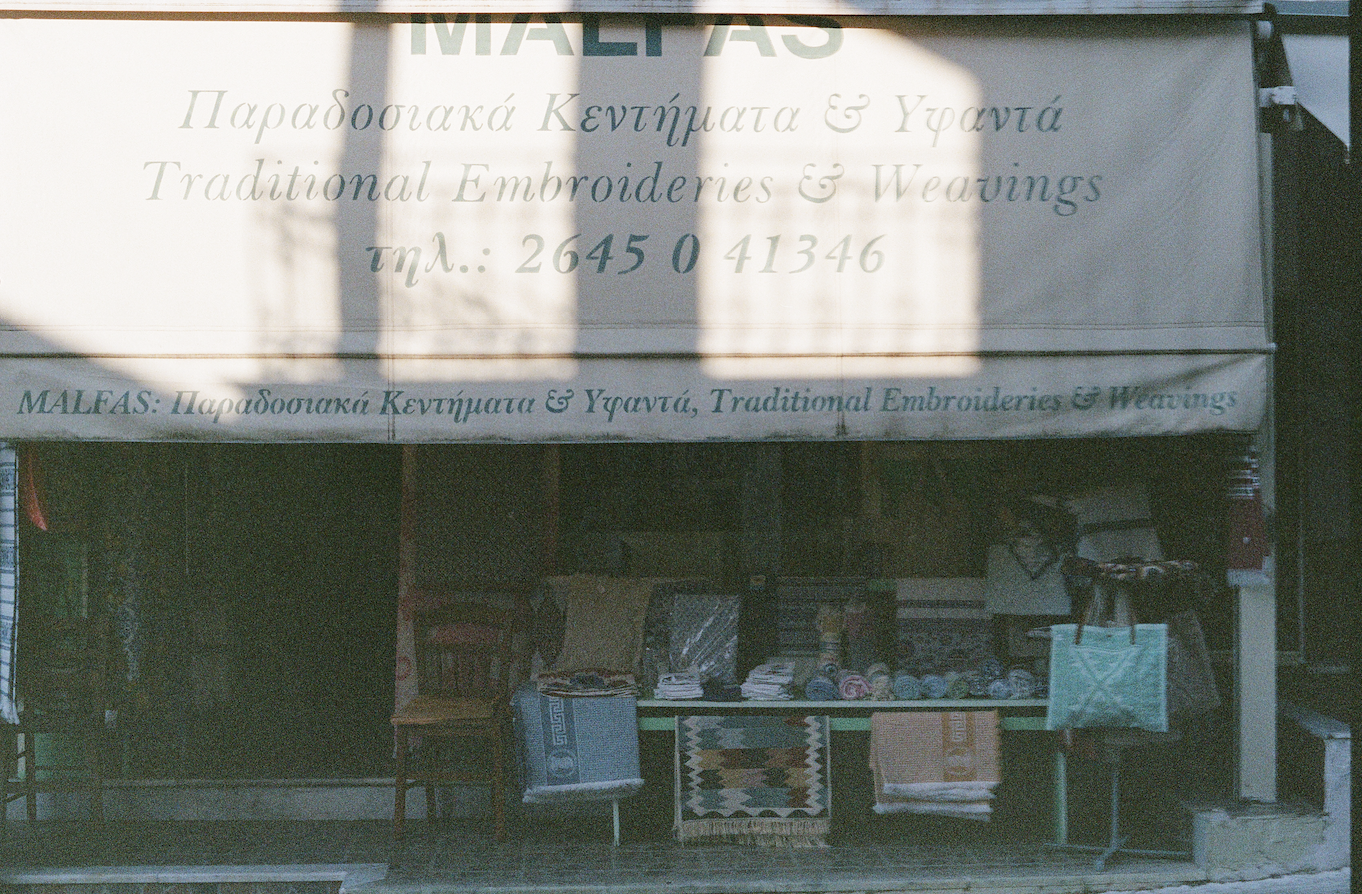
Meet Elpida and Anastasios Malfas, the husband-and-wife team of "Malfas Traditional Embroidery & Weavings" in Karya, Lefkada. Elpida carries the legacy of embroidery passed down from her mother, and Anastasios carries the trade of traveling merchants passed down from his father. Together, they hold the memory of the ones who came before – and perhaps the last generation of traditional Lefkaditan embroidery – in their quaint shop nestled in the mountaintop of their breezy village, Karya, enveloped by lush, ancient trees.
This collection comes from the island of Lefkada, where my mother line is from. It was special to learn about the weaving tradition native to this island and deepen the connection to my roots here. I met Anastasios and Elpida in their shop on a late summer afternoon in June. As we started talking, we came to find out that Anastasios's first cousin was my grandfather's best friend. Among the synchronicities, Anastasios also shares the same name as my papou. I had such a wonderful time sitting down with them both. Our conversation was equal parts honesty and humor. They shared about their lives and the dying art of weaving—and the special "karsaniko" stitch that originated from this village, Karya. Read the full interview below, or watch it here.
(Interview has been translated from Greek).
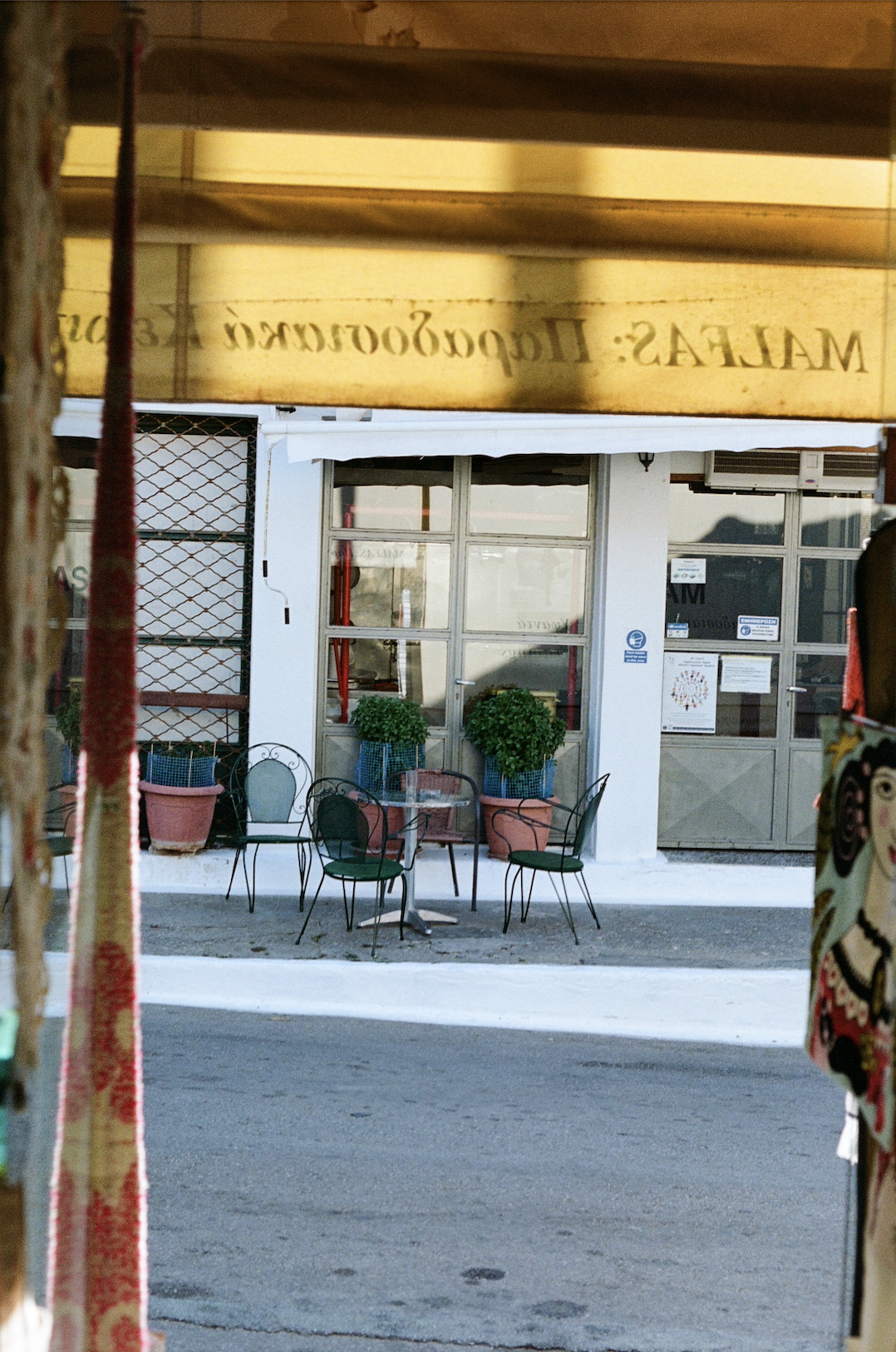
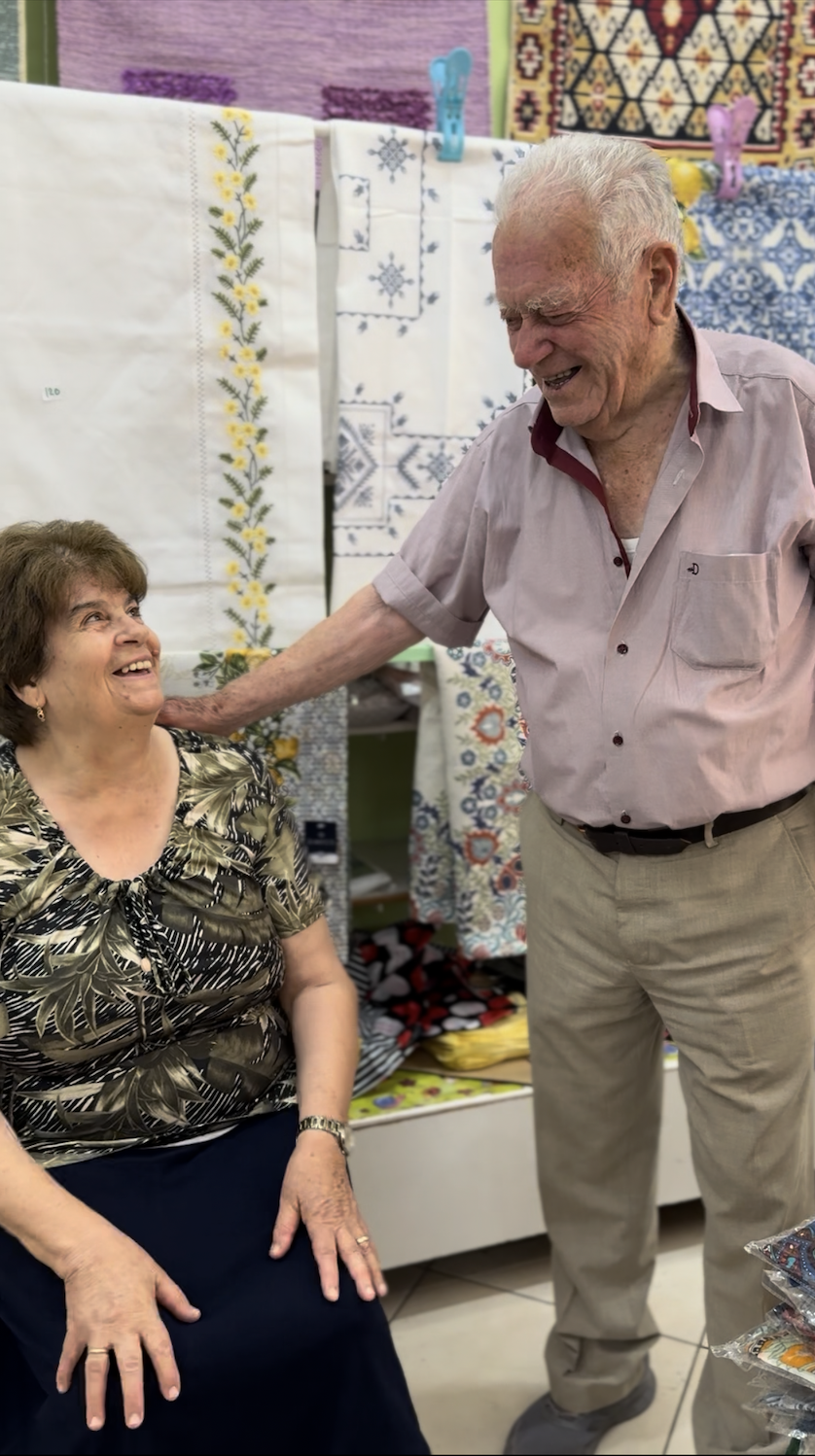
"I learned all these things from my mother. From one to the next... It's a very beautiful stitch, but now it's going to disappear."
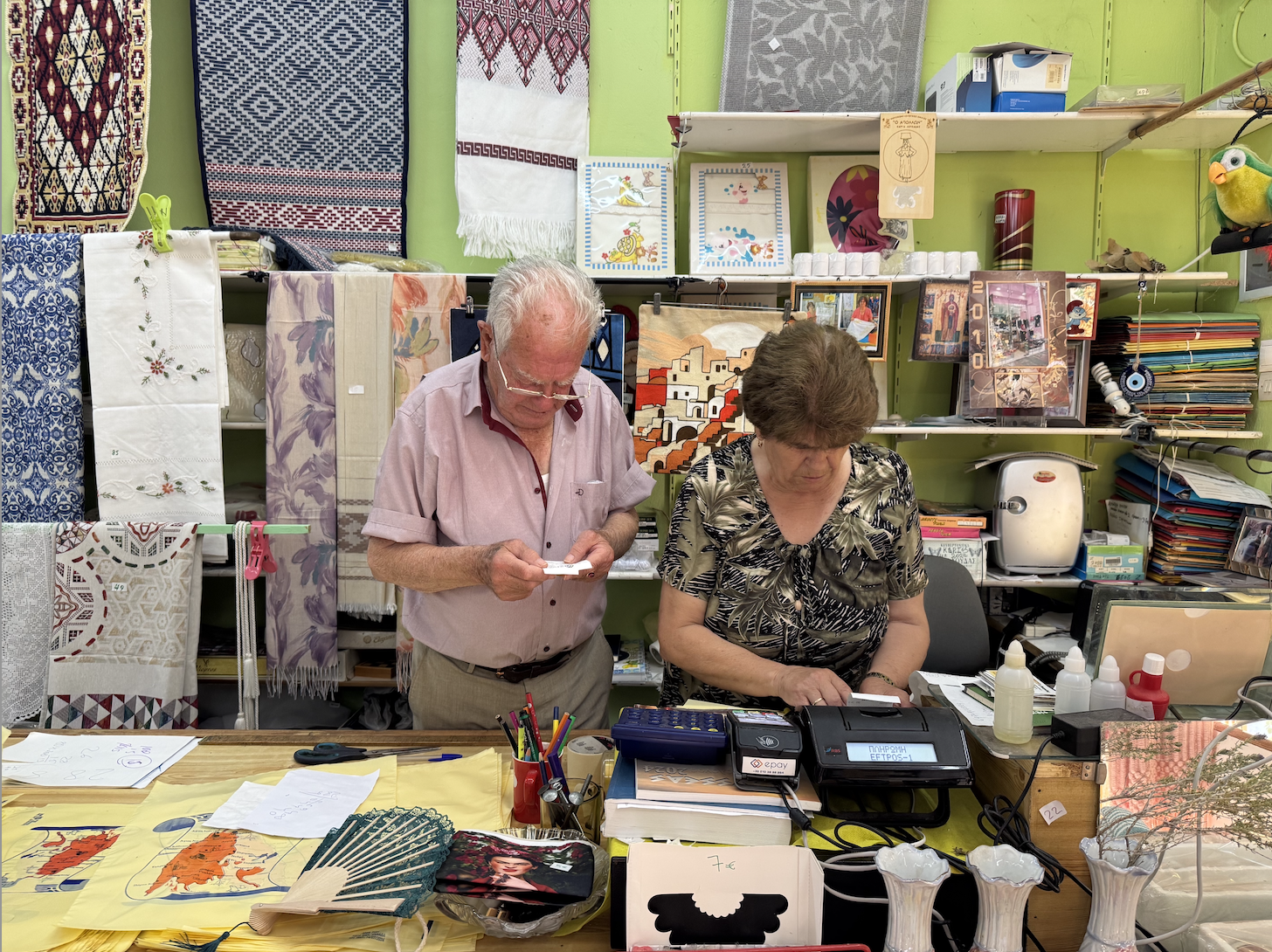
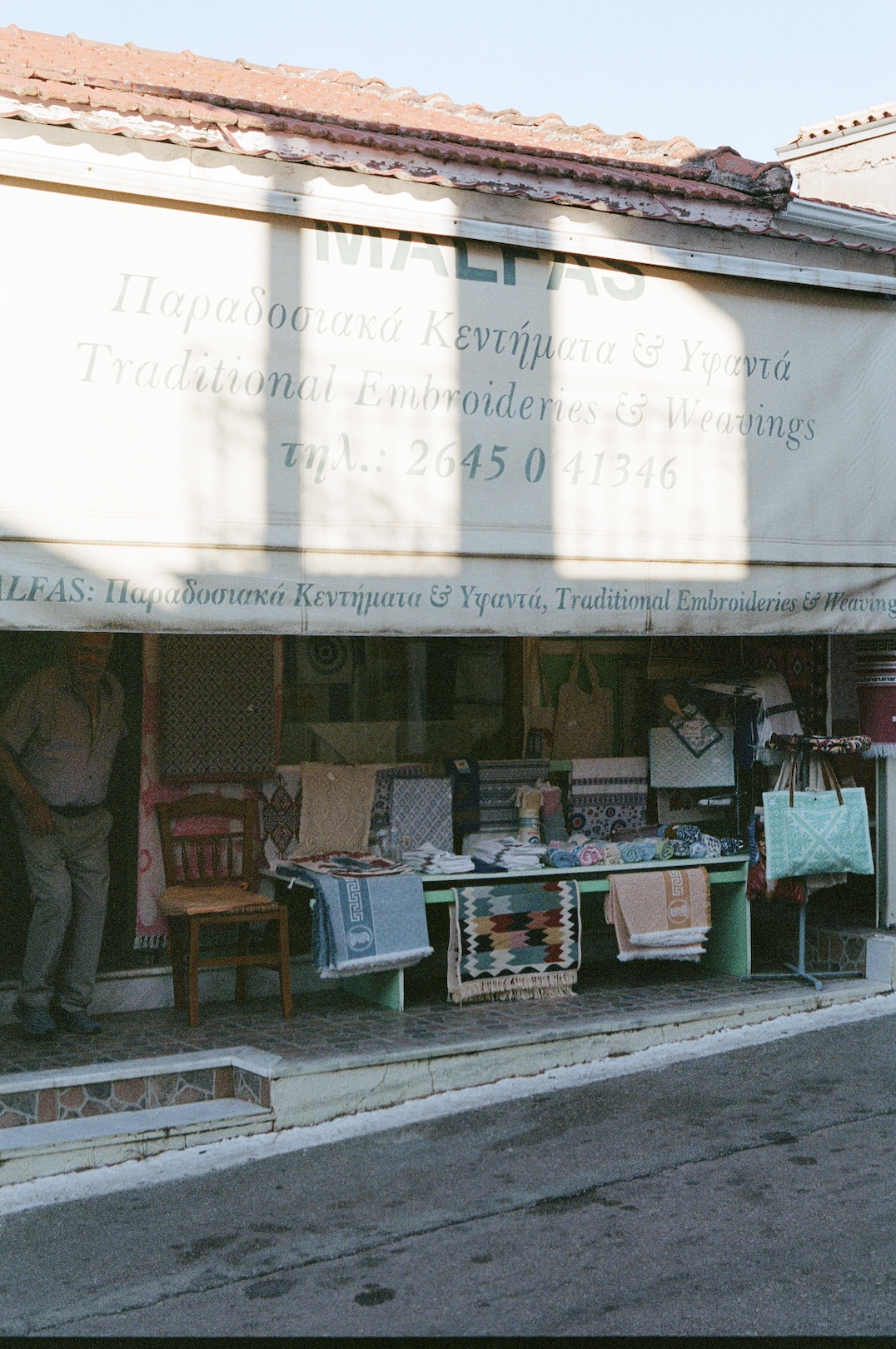
[Eleni]: How many years have you had the shop here?
[Anastasios]: Many years. Around 40 years. This very shop, 40 years. I had a shop when I was younger, in a different place. Further away. I've been in the trade since I was 18.
[Eleni]: Where did you grow up?
[Anastasios]: I grew up here. I was born here, I was raised here.
[Eleni]: In Karia?
[Anastasios]: [Yes] I got married here, in a village, Pigadisanous. I got married, I took a wife from Pigadisanous.
[Eleni]: And did you have siblings?
[Anastasios]: Siblings, yes, I had three sisters. I'm the firstborn.
[Eleni]: What it was like growing up? What your life was like?
[Anastasios]: Life was very difficult in my younger years. Very difficult. There was poverty then. There was unemployment. There was no work. Our fathers would have to travel far, digging in the fields just to get a day's wage. It was very hard back then. Very hard.
[Eleni]: How did you find your way into this work?
[Anastasios]: My father started in this work. Years ago, he was a traveling merchant in the villages. I followed him, and my son follows me. It's our tradition. It runs in the family.
[Eleni]: And where do you get all these pieces?
[Anastasios]: They're from small workshops. And they are handmade things, and my wife, she does embroidery.
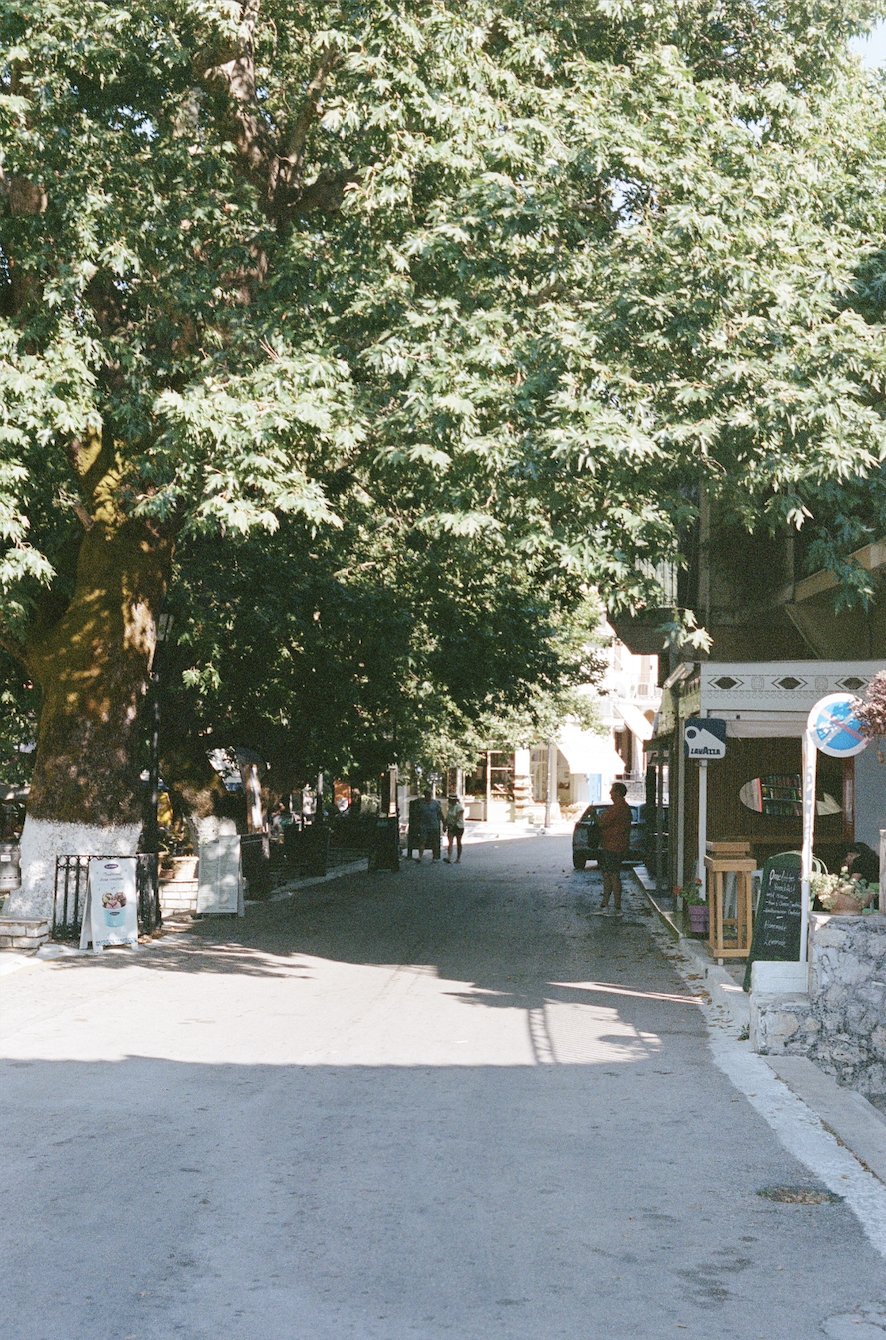
[Eleni]: (to Elpida) Where did you grow up?
[Elpida]: I grew up in the village next over. Pigadisanous. I lived with my mother, just her and I. Orphaned, my father never knew me. My dear mother taught me when I was little, from seven years old. I still embroider, even now. Still a little, I can't see so well now.
[Anastasios]: I married her when she was a woman. 16 years old. So, she was grown up!
[Laughter]
[Eleni]: And what's the age difference between you?
[Anastasios]: She's five years older than me. No, I'm older than her by 15. I'm older by 15, eh!
[Laughter]
[Elpida]: Well yes, you're older, we have a difference, it's okay. It's fine, it's fine. We had three children, very good children. Our children are wonderful. We have three grandchildren.
[Eleni]: Do your children live here, or have they left?
[Elpida]: They live in Athens. The villages used to be full of people, but now everyone's gone.
[Anastasios]: There were 3,000 people here. And the young people head to Athens.
[Eleni]: How many residents does it have now?
[Anastasios]: Now, 300, down from three thousand.
[Elpida]: In summer the people return, a crowd gathers, but in the winter it's quiet. The children are far away, we miss them, but what can you do?
[Eleni]: What do you call the embroidery that's from Lefkada?
[Elpida]: About that famous embroidery, eh? The stitch originated right here, in Karia. It's called "Lefkaditiko" (from Lefkada), but it's "Karsaniko." It came out of Karia. It was born in Karia. Afterward, they learned it, others elsewhere learned the stitch, let's say. Yes, but the source was here. There was a woman, they called her [Maria] Koutsohero, I never knew her, she was very old by then, you see. She had a school and she taught the girls.
[Eleni]: Do we have women who still do it now and are learning?
[Anastasios]: She's recording you, you're on camera! [Laughter]
[Elpida]: Here, usually, no one went to a school. Mother to daughter, and that's how they learned the stitch. I learned all these things from my mother. From one to the next. This stitch is difficult, very difficult. The other stitches, let's say, the back-stitch in other embroideries... That's the front side in the Karsaniko stitch. Both this side and the reverse side are the "good" side. But it leaves no threads on top, so you can't tell the difference. Even we, who make it, still get confused about which is the front and which is the back. It's a very beautiful stitch, but now it's going to disappear.
[Elpida]: There aren't any young ones now, the young ones study, they leave, they go to Athens, that's the end of it. [Laughter] It's an art that is slowly being lost. It's a shame, because the stitch is so beautiful, really, but... I have two girls. One knows a little, the other, not at all. The children don't want to do this now. They have other things now. But that's how it was in those days. And the women would earn, at the end of the day, a wage.
[Anastasios]: The embroidery was created by a woman they called Koutsohero. That's where Karia learned the stitches. They called her Maria Koutsohero.
[Elpida]: That's why it's called "Karsaniko." They call it "Lefkaditiko," let's say, but the source, where it was born, is here. But there wasn't a school back then... Some young girls would go up there but...Usually, it was passed down from mother to daughter. I learned the stitch from my mother. She started me off slowly, from age seven. Little by little. But this is being lost, unfortunately. Slowly, slowly. That's it, life has changed.That's how it is.
[Eleni]: I hope that we can remember these things...so it's not lost.
[Elpida]: How can it not be lost? It will be lost, because...Now, for instance, as much as my daughters might know, does my granddaughter know anything about this? She doesn't. It's being lost! After that... Other relatives, and it's gone. Finished! It gets lost. That's it. Now, the young ones in my family are 25 years old. Do they know this kind of thing at all? No, no. They don't know. That's how it is. Now, if anything is left of it, it will all come from the factories, you see. That's how it is now, everything is from factories. It's not the same. Sometimes the women would earn a day's wage, they would embroider to earn crumbs. They embroidered for free. Nothing, for nothing but for daily bread. They did it out of need, they'd give something, they'd get something back. To provide for the family. That's how it is, dear, that's how it is. That is the story.
[Eleni]: Is there anything else you'd like to say?
[Anastasios]: I married her at 16. Just a baby. [Laughter] Just a little lamb!
[Elpida]: Oh dear me!
[Elpida]: We've been together many years. 61 years, thank God. Life had its hardships. Our children are very good. They just don't live with us, it's okay. As long as they're well. They're well, they visit, we talk on the phone. What can we do... This is life, isn't it?
[Elpida]: In the villages, young people used to stay in the villages, now...
[Anastasios]: Karia had three thousand people, now it has 300.
[Elpida]: It had so many people.
[Anastasios]: Back then they made families, they had 18 children. A family with 18 children. Can you imagine? 18 children in a family? They put them on the floor to count heads to check they were all there.
[Elpida]: Now they don't get married, or if they do, they have one child. Now they have one, two at the most. They want their peace and quiet.
[Laughter]
[Elpida]: Be well, my dear!
[Eleni]: Thank you!
[Elpida]: May the children be healthy and fortunate, dear God. "All the world's children," my late mother-in-law would say.
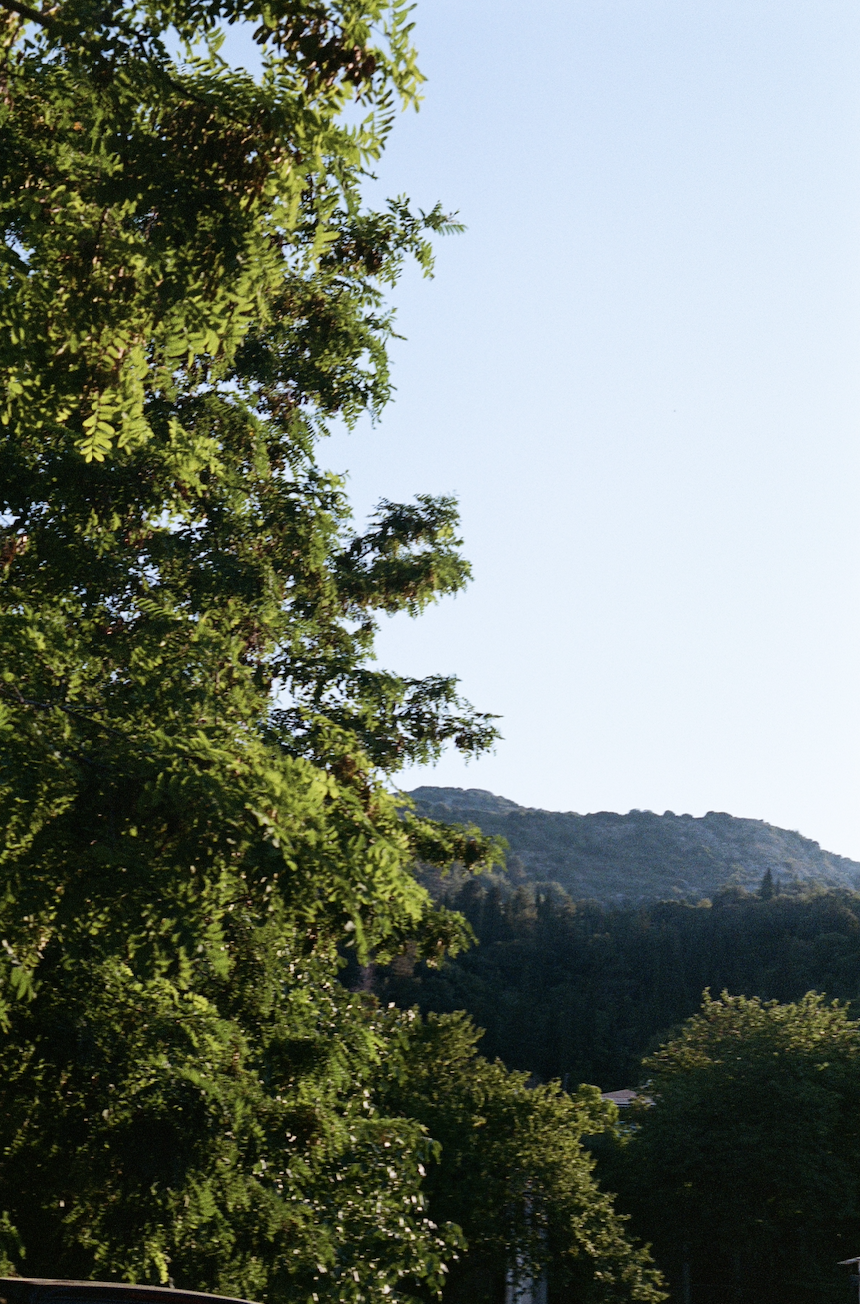
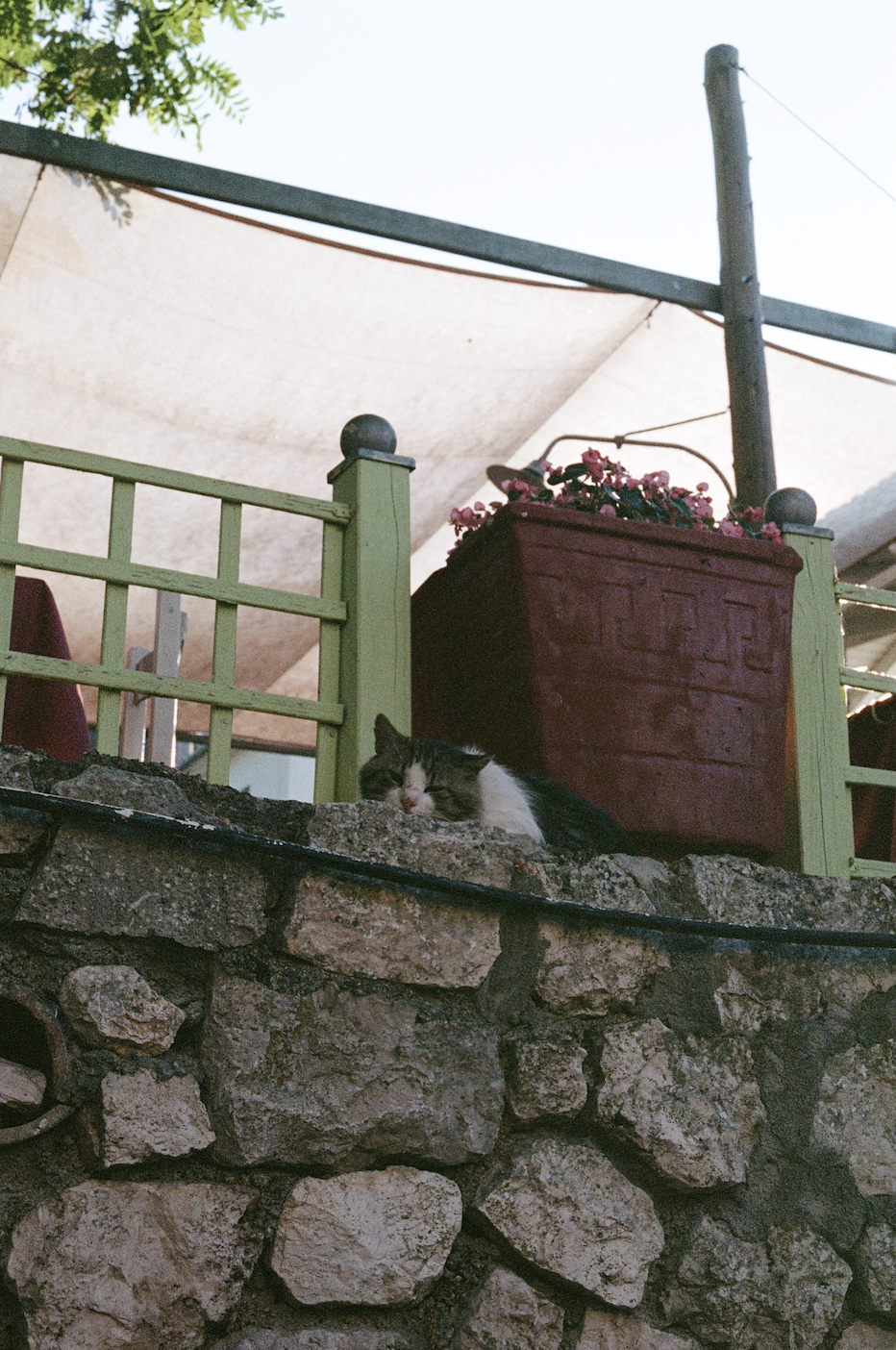
Thank you to the village of Karya for welcoming us. Thank you Elpida & Anastasios for your openness and honesty. It was an honor to hear a piece of your story.
